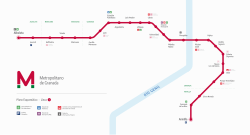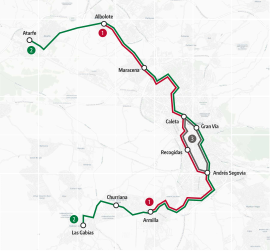
Line B of the Buenos Aires Underground runs 11.75 kilometres (7.30 mi) from Leandro N. Alem to Juan Manuel de Rosas in Villa Urquiza. Line B opened to the public on 17 October 1930.

La Raza metro station is a Mexico City Metro transfer station in the borough of Gustavo A. Madero, in Mexico City. The station features a combination of underground and at-grade buildings; each has two side platforms. La Raza serves Lines 3 and 5. La Raza metro station is located between Potrero and Tlatelolco stations on Line 3, and between Autobuses del Norte and Misterios stations on Line 5.

The Lima and Callao Metro is a rapid transit system that serves the cities of Lima and Callao, which make up the Lima metropolitan area. The existing metro lines currently link the district of Villa El Salvador in the south of Lima with San Juan de Lurigancho in the northeast of the city, as well as a 5 km (3.1 mi) segment in the east of the metro area. Furthermore, there are four additional lines planned for the network.

The Bilbao metro is a rapid transit system serving the city of Bilbao and the region of Greater Bilbao. Lines 1 and 2 have a "Y" shape, as they transit both banks of the river Ibaizabal and then combine to form one line that ends in the south of Bilbao. Line 3 has a "V" shape connecting the municipality of Etxebarri with the Bilbao neighbourhood of Matiko; the apex of the "V" is Zazpikaleak/Casco Viejo station, where all three current lines meet. The metro is connected with the Bilbao tram, Bilboko Aldiriak, Euskotren Trena, Feve, Renfe long-distance trains, and Bilbao's bus station. All three lines use metre gauge.

Metrorrey, officially Sistema de Transporte Colectivo Metrorrey, is a rapid transit system that serves the metropolitan area of Monterrey. It is operated by the Sistema de Transporte Colectivo Metrorrey, which is part of the decentralized public administration of Nuevo León. In 2022, it was the sixth largest metro system in North America by ridership.

The Tren Suburbano is an electric suburban rail system in Mexico City. It is operated by Ferrocarriles Suburbanos with concessioned trains from Construcciones y Auxiliar de Ferrocarriles (CAF). It was designed to complement the extensive Mexico City metro system, Latin America's largest and busiest urban rail network.
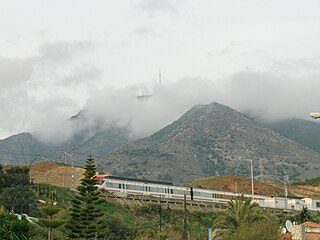
Cercanías Málaga is a commuter rail service between central Málaga, Spain, and towns in the province. The network consists of 70 kilometres (43 mi) of track, with two lines and 23 stations in operation. The trains are powered by overhead lines and run on broad Iberian gauge track.
Ferrovial S.E., previously Grupo Ferrovial, is a Spanish multinational company that operates in the infrastructure sector for transportation and mobility with four divisions: Highways, Airports, Construction, and Mobility and Energy Infrastructure. The Highway sector develops, finances, and operates tolls on highways such as the 407 ETR, the North Tarrant Express, the LBJ Express, Euroscut Azores, I-66, I-77, NTE35W, and Ausol I. The Construction business designs and builds public and private works such as roads, highways, airports, and buildings. The Mobility and Energy Infrastructure Department is responsible for managing renewable energy, sustainable mobility, and circular-economy projects. Ferrovial is present in more than 20 countries where its business lines operate.

Metrovalencia is an urban rail including rapid transit and trams, serving Valencia and its metropolitan area. The network is a modern amalgamation of former FEVE narrow gauge electric-operated suburban railways. It is a large suburban network that crosses the city of Valencia, with all trains continuing out to the suburbs. It also has destinations on lines that make it more closely resemble commuter trains. The unique system combines light railway, metro and several tram operations north of the Túria riverbed park with line 4. Trains of lines 1, 3, 5 and 9 have automatic train operation (ATO) in 25.3 kilometers of underground system. Tram lines 4, 6, 8 and 10 are operated by modern trams.

Tenerife Tram is a light rail or tram service located on the island of Tenerife, one of the Canary Islands in Spain. It is operated by Metropolitano de Tenerife, a limited company now 100% owned by Cabildo de Tenerife. Service started on 2 June 2007 over a 12.5-kilometre (7.8 mi) route that linked the Intercambiador in Santa Cruz de Tenerife with Avenida de la Trinidad in La Laguna. A second line between La Cuesta and Tíncer opened in 2009. It is the only existing tramway or train in the Canary Islands.
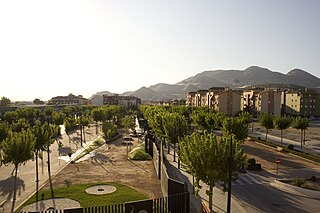
Atarfe is a Spanish city in the north central part of the Vega of Granada in the province of Granada, Andalusia. It borders the municipalities of Moclín, Colomera, Albolote, Maracena, Granada, Santa Fe, and Pinos Puente. By this village run the Rivers Cubillas and Colomera. Its districts include Caparacena, Sierra Elvira, Hurpe and Cubillas.
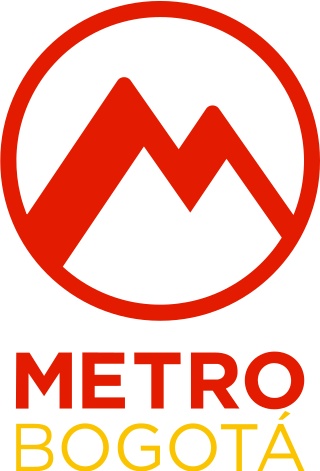
The Bogotá Metro is a rapid transit project under construction in Bogotá, Colombia, it is projected to be in operation in 2028. Construction started in October 2020.

Metropolitano Stadium, also referred to as Riyadh Air Metropolitano for sponsorship reasons, is a stadium in Madrid, Spain. It has been the home stadium of Atlético Madrid since the 2017–18 season. It is located in the Rosas neighbourhood, in the San Blas-Canillejas district.

Gran Vía is a station on Line 1 and Line 5 of the Madrid Metro, located underneath the Gran Vía and Red de San Luis Plaza in the Centro district of Madrid. It is located in fare zone A.

The Panama Metro is a rapid transit system in Panama City, Panama. It links neighborhoods north and the east of the metropolitan area to the city center.
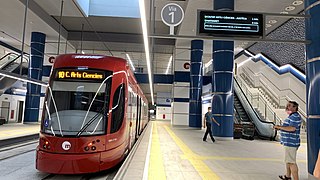
Line 10 is a tram line which forms part of Metrovalencia in the city of Valencia, Spain. It opened on 17 May 2022. From 2007 until 2014, the line was designated as line 2. However, in November 2014, this designation was given to a branch of the existing Line 1, effective from April 2015. The line was then referred to as 'T2' until 1 March 2018 when it was decided to name it Line 10, to avoid confusion with existing metro lines.
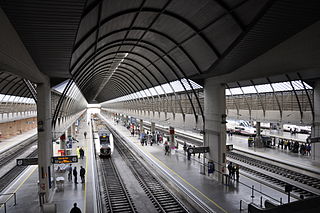
Seville–Santa Justa railway station is the major railway station of the Spanish city of Seville, Andalusia. It was opened in 1991 with the inauguration of the Madrid–Seville high-speed rail line, and serves around 9.25 million passengers a year.

Line 1 of the Granada Metro is a light rail line running from Albolote in the north to Armilla in the south, via Maracena and the center of Granada city. Today it has 26 stations and spans 15,920 km (9,890 mi) from end to end.

Mi camino es amarte is a Mexican telenovela that aired on Las Estrellas from 7 November 2022 to 12 March 2023. The series is produced by Nicandro Díaz González. It is an adaptation of the Chilean telenovela El camionero, created by Luis López Aliaga. It stars Susana González, Gabriel Soto, Mark Tacher and Ximena Herrera.


